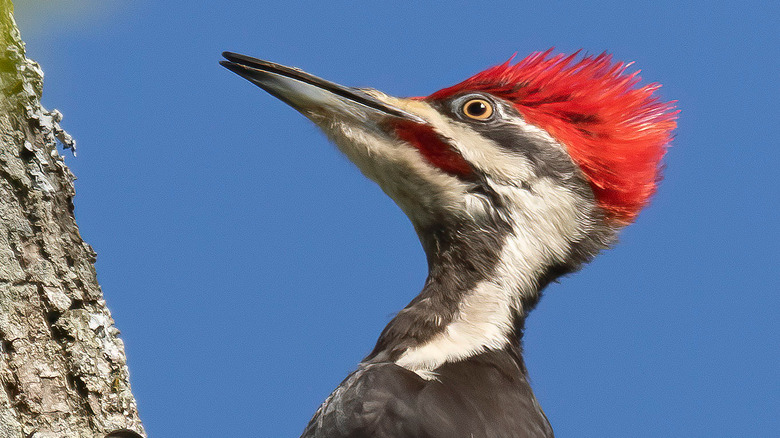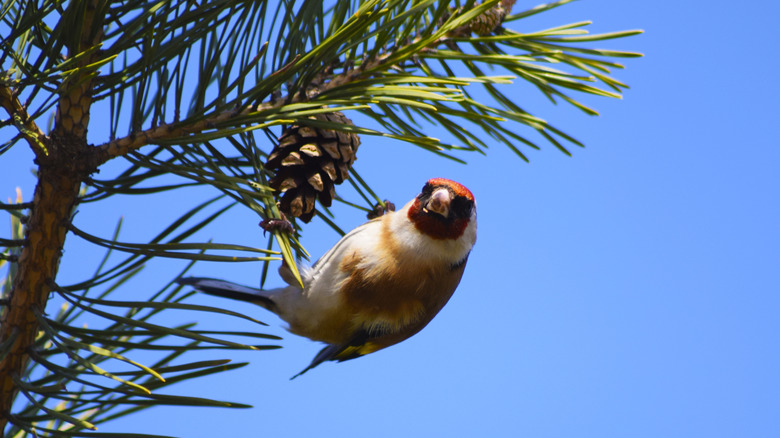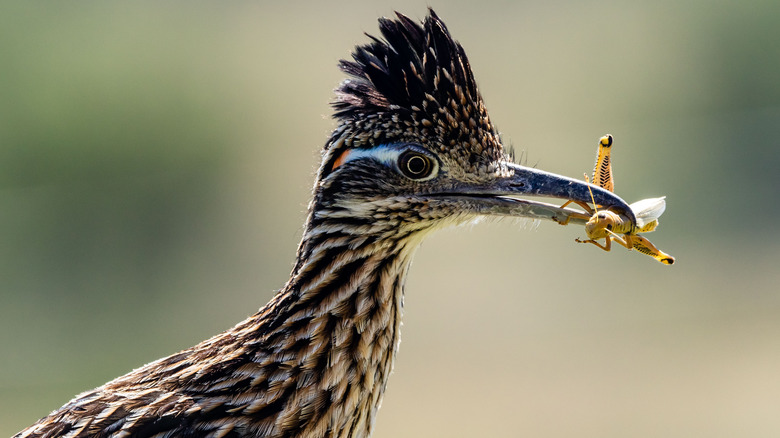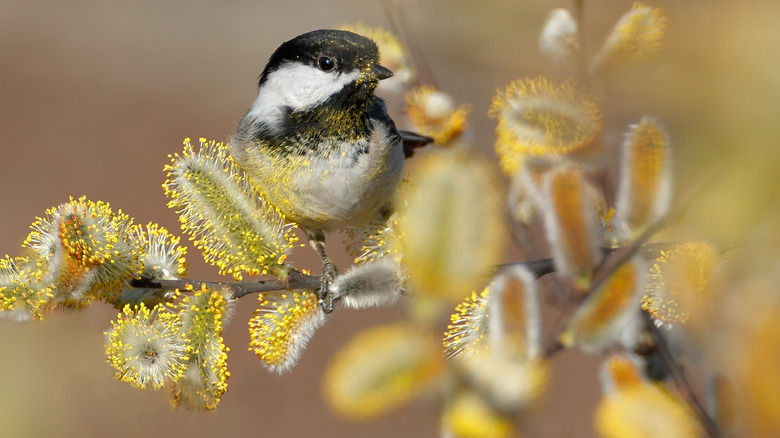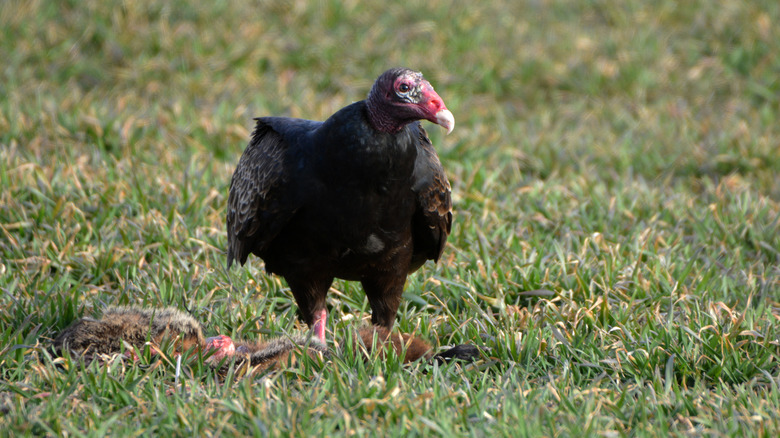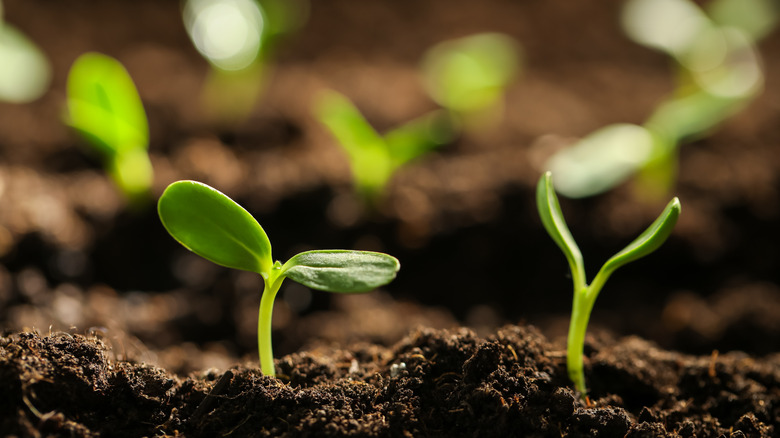The Terrifying Reality The World Would Face If Birds Went Extinct
Birds exist on every continent, and experts aren't exactly certain how many there are. That said, estimates range between 50 and 428 billion, per National Geographic. Research indicates that house sparrows are the most plentiful on Earth, with a population of 1.6 billion, followed by starlings with a population of 1.3 billion.
While the number of birds on the planet seems staggering, some are facing extension. National Geographic reports that spotted kiwis, Javan hawk eagles, and Seychelles kestrels are endangered. In 2021, the United States Department of Interior proposed to remove some birds from the Endangered Species Act because they are believed to be extinct. Birds on that list include the ivory-billed woodpecker and Bachman's warbler. The National Audubon Society reports that 1,200 species of birds could go extinct in the next 100 years if action is not taken. And humans don't want to face a reality without birds because the end result would be terrifying.
Seeds wouldn't get distributed
One of the most important things birds do is disperse seeds, and they do this in many ways. One way is through their poop. When birds eat fruit and berries, they also consume the seeds in them. However, some birds can't digest seeds, so they end up moving through the digestive system and getting pooped out onto the ground, where new seedlings will sprout (via One Earth). In addition, seeds invariably fall to the ground when birds eat fruit, berries, and pine cones.
Some birds distribute seeds when they bury them for winter. Whatever they don't get around to eating takes root the following spring. An example is the Clark's nutcracker, which is the only bird that distributes the seeds of the whitebark pine tree in the Western U.S., according to the National Audubon Society. The nutcracker buries seeds but doesn't eat them all, giving new trees an opportunity to grow. Without the nutcrackers, whitebark trees might not be able to survive. The truth is if we didn't have birds dispersing seeds, many plants and animals would have trouble surviving (via Smithsonian Magazine).
Insect populations would be out of control
Many birds eat insects as part of their diet. A paper published in The Science of Nature explains that globally, birds eat around 400 to 500 metric tons of bugs. In fact, they eat almost as much as spiders do. According to Mother Earth News, one swallow can eat as many as 2,000 leafhoppers in one day, and a Baltimore oriole can consume about 17 caterpillars in just 60 seconds. When feeding their young, industrious house wrens can catch about 500 insects in just one afternoon.
If we didn't have birds to help keep the insect population down, we might soon be overrun with pests that could wipe out crops, making some food sources scarce. And the scary thing is that this has actually happened before. In the 19th century, settlers in Utah lost crops due to an infestation of crickets, only to be saved by hundreds of seagulls who flew in and feasted on the insects, reports the National Audubon Society.
Some plants wouldn't get pollinated
Birds are pollinators, too. The National Audubon Society reports that more than 900 species of birds help pollinate plants. When birds visit flowers for nectar, pollen sticks to their bodies and gets distributed as they visit more flowers. Several birds pollinate crops in tropical areas, with some plants depending on specific birds to pollinate them. For instance, spiderhunters are the only birds that pollinate the durian munjit plant in Borneo. While birds don't pollinate food crops in the U.S., around 200 species of birds pollinate flowers (via Britannica).
You've probably heard about what would happen if we lost bees, and many plants would suffer the same fate without birds. EcoWatch reports that 87 out of 115 of the main crops in the world depend on pollination. Without it, the ecosystem would be thrown off balance, and we would lose a variety of food items, including apples, strawberries, coffee, onions, avocados, beets, cauliflower, and grapes.
The world would be dirtier
Some birds help keep the environment clean. You've probably seen a vulture on the side of the road devouring road kill at some in your life. While it's not exactly a pleasant sight to see, vultures picking apart dead animals are playing their part in the community. One fascinating fact about vultures is that they only eat the carcasses of other dead animals, and some types of vultures live mostly on the bones of other carcasses, per National Geographic.
Scavengers — like vultures — help the environment because they not only remove the dead animals but also remove the bacteria and diseases on them. Vultures don't generally have to worry about disease and germs because their digestive systems contain acids that kill bacteria that might give other scavengers rabies or other illnesses. If we didn't have vultures, other animals would eat dead carcasses and become infected by viruses and other diseases, potentially spreading those diseases to humans, per the University of Utah.
Soil and plants wouldn't get fertilized
Bird poop is good for more than spreading seeds around. You might get annoyed when a bird poops on your car, but bird poop is actually good for the ecosystem in several ways. For one, it is filled with nutrients, like phosphorus, which makes a nourishing fertilizer for soil and plants. In fact, bird guano was used as fertilizer in the 1800s, and at one time, it was a hot commodity. While it isn't used as much as it once was, it is an organic alternative to commercial fertilizer (via Smithsonian Magazine).
Sciencing reports that bird poop also contains nitrogen, which helps seeds germinate wherever they land. This fertilization process is especially important in tropical forests, where more than 80% of the trees depend on seed dispersal from birds and other animals, per the National Audubon Society. Without the proper nutrients, soil degrades, and that means the crops we grow in it lose nutrients, too. In fact, several studies suggest that produce has experienced a decline in nutrients, according to Scientific American. While there is no singular cause for soil depletion, not having birds around to fertilize soil would make things worse.
